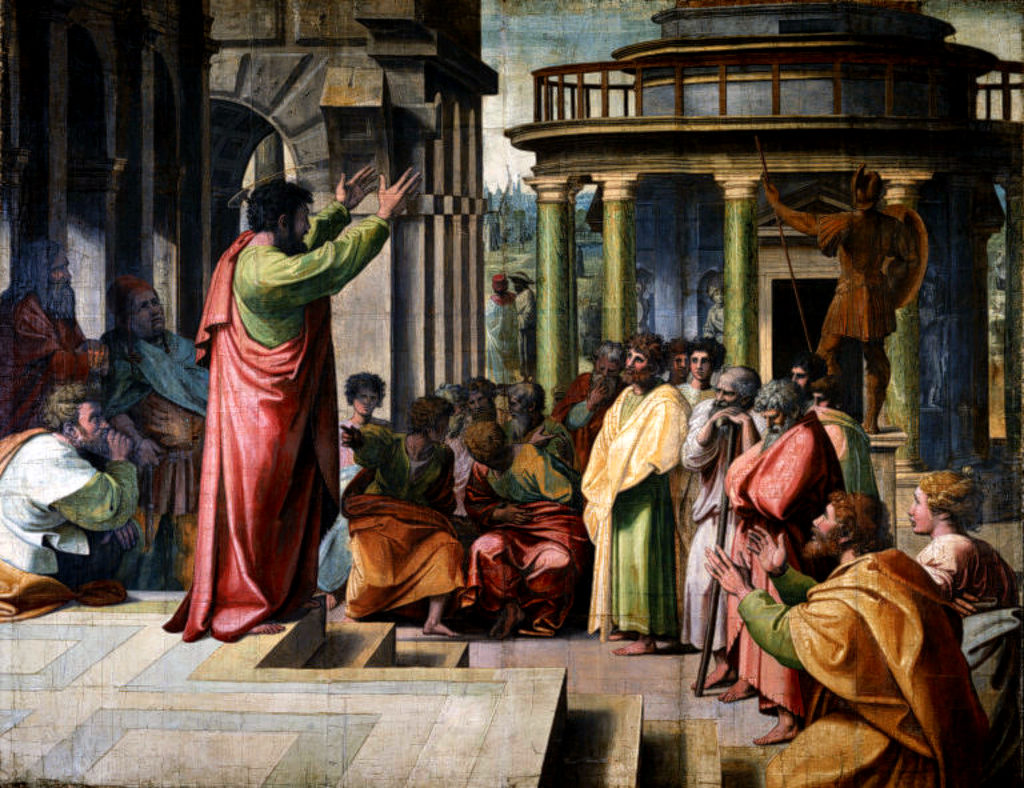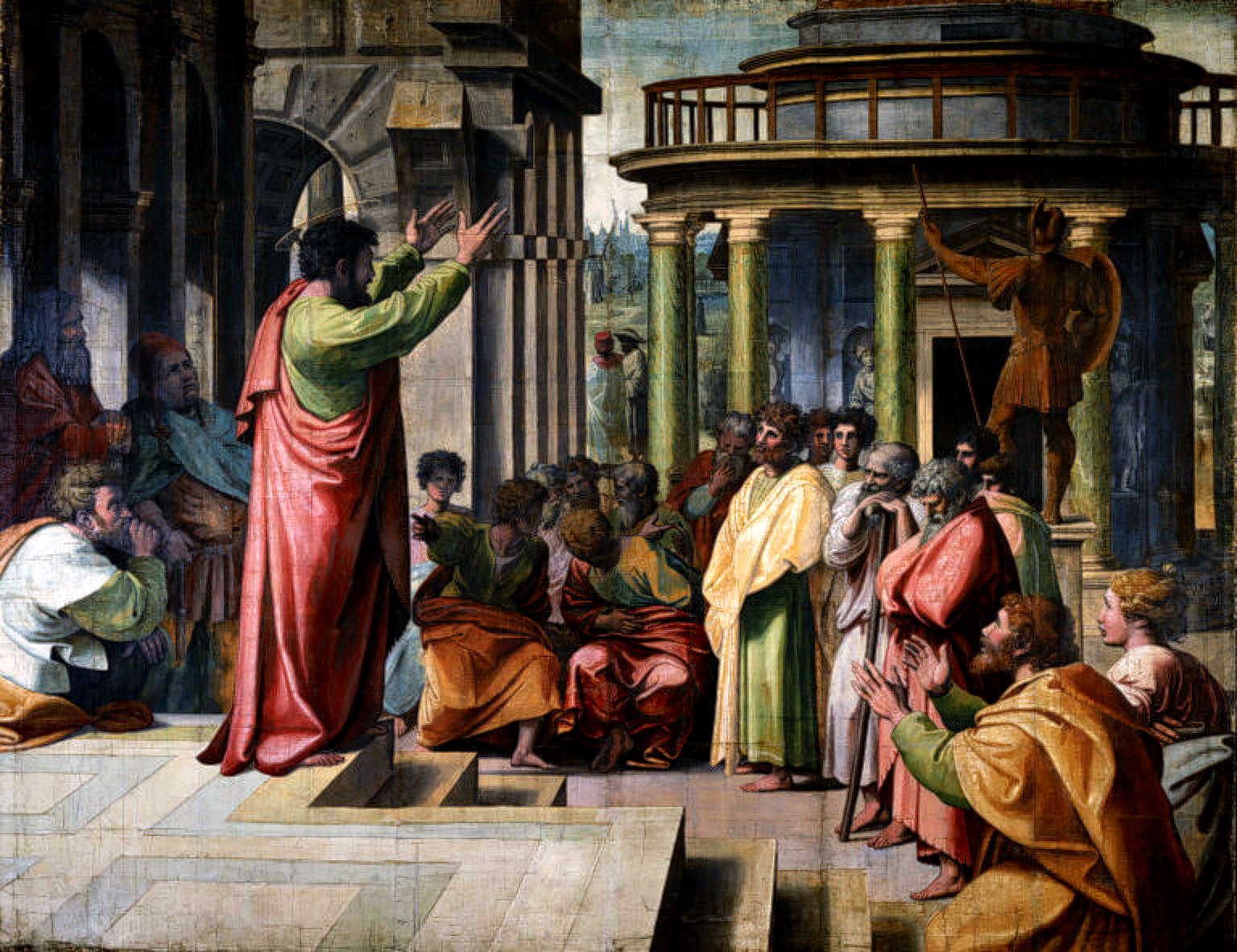
Paul in Athens
Devotions on Acts 17:16-31
Monday–Paul in Athens
“He was deeply distressed to see that the city was full of idols” (Acts 17:16).
Cal participates in several of his congregation’s missions projects. It wasn’t until he participated in a Habitat for Humanity build that he got hooked. As Cal tells the story, when he worked side by side with the family who was going to receive the home and heard what a difference it was going to make in their life, he knew he wanted to spend more time changing the lives of other families. Cal has now participated in several builds. His greatest joy is seeing the faces of the family members when they receive the keys to their new home.
Paul looked at all of the statues and temples as he walked around Athens. As a Jew, he should have been disgusted at the wanton idolatry. Instead, he was distressed. Paul connected emotionally with the plight of the Athenians. The plethora of idols was more than a fact that he read about in a book, or a topic of conversation in the marketplace.
It is easy for us as followers of Jesus to get so wrapped up in our own lives that we aren’t able to become emotionally involved in the lives of others and in situations of need. Jesus, though, always invites us to look beyond ourselves and to get involved. When we care, the Holy Spirit can do great things through us.
Lord, empower us to open ourselves to all of life—to feel and to care—and may our caring motivate us to serve. Amen.
Tuesday–Paul in Athens
“So he argued in the synagogue with the Jews and the devout persons, and also in the marketplace (Acts 17:17).
How do we talk about our faith, and to whom? Paul acted on his distress and began discussions with his fellow Jews, with people who were interested in their relationship with God, and also with the general public. His words were his witness.
Greek society openly discussed matters of religion and faith. We live in societies where such discussion is generally frowned upon. A few of us may have also had the unpleasant experience of having someone attempt to jam their religious viewpoints down our throats and we don’t want to do that to others. Even though Christianity was not an accepted religion at the time of Paul, we may face a greater challenge in sharing our faith than Paul did.
The challenge is not insurmountable, however. We place a great deal of importance on our actions. It is important that our actions need to be backed up by our words. People need to know why we do what we do. Once we acknowledge the importance of words, in our lives of faith, then we can begin to be aware of appropriate opportunities to share our faith in a loving and gracious manner.
Lord, anoint our words that they may always bear witness to your love and grace. Amen
Wednesday–Paul in Athens
“May we know what this new teaching is that you are presenting” (Acts 17:19)?
The words “new” and “improved” always catch our eyes. Marketers know this is true and that’s why we see so many new and improved item on our grocery store aisles.
Even though Jesus taught over two thousand years ago, his words are still “new” and “improved.” Instead of the old emphasis that God is an angry God, Jesus proclaims that God is a God of love. Instead of the old “work hard” to please God, Jesus invites us to rest in God’s love and to share the love that we have received. Yes, we tell the “old, old story,” but it never stops being new and improved—something that we and the world need to hear every day.
Like the dew on the grass, move in our lives, Lord, so that your love and grace are new every morning. Amen.
Thursday–Paul in Athens
“’Athenians, I see how extremely religious you are in every way’” (Acts 17:22).
Historically it has often been taught that God comes to us in judgment rather than in love. We talk about God’s judgment day and God’s displeasure at our sinful ways. The fear of hell and eternal damnation have been stressed. Some branches of the Christian Church even work with the doctrine of total depravity—there is nothing good about us. Times, though, are changing.
Recently Biblical scholars and a few popular Christian books have questioned the existence of hell. Judgment Day is seen as a metaphor rather than a future event. Emphasis is being placed on God’s love rather than God’s judgment.
Paul’s words reflect God’s love. He compliments the Athenians on their religiosity, instead of pronouncing God’s judgment upon them. Paul plays upon a common human trait. We like to be praised rather than criticized. This doesn’t change the fact that we are self-centered and rebel against God’s lordship in our lives. Stressing God’s love rather than judgment does enable us, though, to base our relationship with God on a firmer foundation. As we experience the rigors of living daily as followers of Jesus, we do so living in the knowledge of God’s steadfast love, overwhelming grace, and unconditional forgiveness.
We rejoice, Lord, that you come to us in love. So move in our lives that love is the basis of our relationship with you and with others. Amen.
Friday–Paul in Athens
“The God who made the world and everything in it … does not live in shrines made by human hands” (Acts 17:24).
As a childhood friend, Aimee decided to visit Susan. The date was set. In the text Aimee received just before she got into her car, Susan typed, “Don’t forget that I’ve moved. I live about two miles from where we grew up.” Susan than gave Aimee her new address.
God has moved. At one time the Israelites believed that God inhabited the temple in Jerusalem. When Jesus died on the cross, the temple curtain was torn in two. God moved—God broke out of the confines of the temple. On the day of Pentecost, the disciples and followers of Jesus received the Holy Spirit. God moved and took up residence in the lives of God’s people. The God of all creation cannot be contained in physical structures, but God does take up residence in human hearts. God has moved and we are God’s new home.
“Into our hearts, into our hearts, come into our hearts Lord Jesus. Come in today. Come in to stay. Come into our hearts, Lord Jesus.” Amen (Old Sunday school hymn)
Saturday–Paul in Athens
“So that they would search for God and perhaps grope for him and find him, though indeed he is not far from each of us” (Acts 17:27).
Candice searched and groped for God in the midst of her diagnosis of breast cancer. She found God while in the depths of despair and surrounded by her friends. She discovered that God had never left her and that God had been by her side all along. Ken found God at the baptism of his child. He was returning to church after been absent for over a decade. At the baptism, he realized that though he had left the church God had never left him.
There are times when we convince ourselves that God is not with us. Things don’t go our way, we fall and fail or we simply get caught up in our rebellion against God. We don’t feel God so God has left us. God isn’t answering our prayers so obviously we have been abandoned. There are times when we search very hard for God and at other times we are frantically groping for God. Usually our search ends when we bump into God, God encircles us with God’s loving embrace and we realize that God was right next to us. Some things never change!
Open our eyes, Lord, we want to see Jesus. Amen.
Sunday–Paul in Athens
“For in him we live and move and have our being” (Acts 17:28).
While most of the United States has been having bad weather with cold temps and lots of snow, Arizona has been enjoying sunshine and temps in the 90’s F. The people in Arizona have been able to enjoy the outdoors and participate in their favorite activities of golf, hiking or sitting around the pool. Flip flops, shorts and golf shirts have been the accepted outfit as people live, move and have their being. The northern snows and temps don’t affect them.
Living in God’s kingdom, we enjoy the love and grace of God no matter what is happening around us. We rejoice in our renewed and reconciled relationships with God, We celebrate our new purposes in life. With God as the source of our lives, we are complete and the abundant life, for which we were created, is ours.
Thank you, Lord, that in you we have the fullness of life. Amen.

